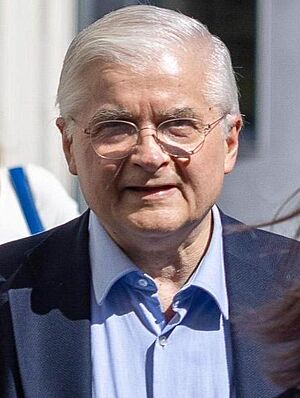Włodzimierz Cimoszewicz facts for kids
Quick facts for kids
Włodzimierz Cimoszewicz
|
|
|---|---|

Cimoszewicz in 2024
|
|
| Prime Minister of Poland | |
| In office 7 February 1996 – 31 October 1997 |
|
| President | Aleksander Kwaśniewski |
| Deputy | Grzegorz Kołodko Roman Jagieliński Mirosław Pietrewicz Marek Belka Jarosław Kalinowski |
| Preceded by | Józef Oleksy |
| Succeeded by | Jerzy Buzek |
| Marshal of the Sejm | |
| In office 5 January 2005 – 18 October 2005 |
|
| Preceded by | Józef Oleksy |
| Succeeded by | Marek Jurek |
| Minister of Foreign Affairs | |
| In office 19 October 2001 – 5 January 2005 |
|
| Prime Minister | Leszek Miller Marek Belka |
| Preceded by | Władysław Bartoszewski |
| Succeeded by | Adam Daniel Rotfeld |
| Minister of Justice Public Prosecutor General |
|
| In office 26 October 1993 – 1 March 1995 |
|
| Prime Minister | Waldemar Pawlak |
| Preceded by | Jan Piątkowski |
| Succeeded by | Jerzy Jaskiernia |
| Member of the European Parliament for Poland |
|
| In office 1 July 2019 – 15 July 2024 |
|
| Member of the Sejm | |
| In office 4 June 1989 – 18 October 2005 |
|
| Personal details | |
| Born | 13 September 1950 Warsaw, Poland |
| Political party | United Workers' Party (1971–1990) Social Democracy (1990–1999) Democratic Left Alliance (1999–2005) Independent (Since 2005) |
| Other political affiliations |
Progressive Alliance of Socialists and Democrats (Since 2019) The Left (Since 2024) |
| Spouse | Barbara Cimoszewicz |
| Children | 1 |
| Education | University of Warsaw |
| Awards | |
Włodzimierz Cimoszewicz, born on September 13, 1950, in Warsaw, Poland, is a well-known Polish politician. He has held many important roles in the Polish government. These roles include being the Prime Minister of Poland, the Minister of Foreign Affairs, and the Marshal of the Sejm (which is like the speaker of the Polish parliament). He also served as a Member of the European Parliament.
Contents
A Look at Włodzimierz Cimoszewicz's Career
Włodzimierz Cimoszewicz has been involved in Polish politics for a long time. He was a member of the Democratic Left Alliance, a left-wing political group.
Becoming Prime Minister
Cimoszewicz served as the Prime Minister of Poland from February 1996 to October 1997. During this time, he also led a special committee. This committee was in charge of getting Poland ready to join the European Union. He worked hard to prepare Poland for this big step.
Working as Foreign Minister
Later, Cimoszewicz became the Foreign Minister of Poland. He held this position from 2001 to 2005. As Foreign Minister, he helped sign an important agreement. This agreement, called the Accession Treaty, allowed Poland to become a member of the European Union. This was a very significant moment for Poland.
Speaker of Parliament
From January to October 2005, Cimoszewicz took on another important role. He became the speaker of the Sejm. The Sejm is the lower house of the Polish parliament, where laws are made.
Presidential Elections
Cimoszewicz ran for Polish President in 1990. He received about 9 percent of the votes. He also considered running again in the 2005 Polish presidential election. At first, he was very popular in the polls. However, he later decided to withdraw from the election. He then said he would leave politics.
Returning to Politics
Despite his earlier promise, Cimoszewicz returned to politics in 2007. He won a seat in the Senate, which is the upper house of the Polish parliament. He served as a senator until 2015.
In 2009, he was a candidate for the Secretary General of the Council of Europe. This is a big international role. However, another candidate was chosen for the position.
Since 2015, Cimoszewicz has been working with the Agency for the Modernisation of Ukraine (AMU). His job there is to help fight against corruption.
Member of the European Parliament
In the 2019 European Parliament election, Cimoszewicz was elected as a MEP. He represented the Warsaw area in the European Parliament. His term as an MEP ended in July 2024.
Views on Ukraine
In May 2014, Cimoszewicz shared his thoughts on the situation in Ukraine. He was concerned about the Russian actions in Crimea. He believed that the democratic countries of the West had not reacted strongly enough. He said that if aggressive policies are not stopped early, it could lead to bigger problems. He also mentioned that the future of Crimea would be very difficult to resolve.
See also
 In Spanish: Włodzimierz Cimoszewicz para niños
In Spanish: Włodzimierz Cimoszewicz para niños
 | Tommie Smith |
 | Simone Manuel |
 | Shani Davis |
 | Simone Biles |
 | Alice Coachman |

